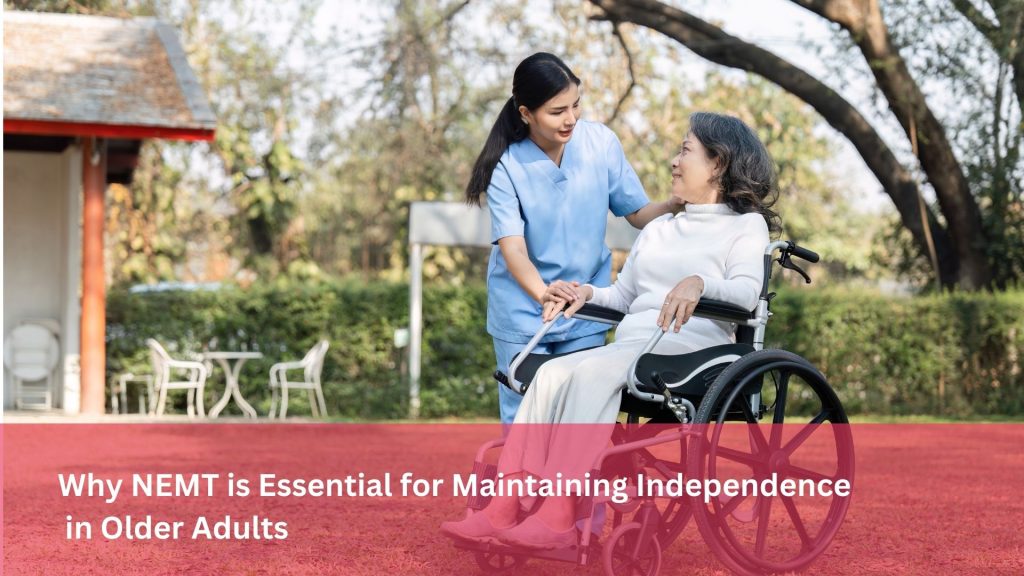New at Safr Care
Why NEMT is Essential for Maintaining Independence in Older Adults

Why NEMT is Essential for Maintaining Independence in Older Adults
For many older adults, maintaining independence is a key aspect of their well-being. As mobility becomes limited with age, driving or using public transport can become challenging or unsafe, leading to potential isolation. Non-Emergency Medical Transportation (NEMT) services are crucial in ensuring that seniors maintain their independence by providing safe, reliable, and accessible transportation options. This article discusses the importance of NEMT in helping older adults access medical care, social activities, and essential services, thus supporting their autonomy and quality of life.
1. Access to Medical Care
Regular medical appointments are critical for managing chronic conditions and maintaining health in older age. NEMT provides:
- Reliable Transportation: Ensures seniors can reach healthcare providers regularly without depending on family or public transit.
- Accommodation for Mobility Issues: Equipped vehicles with wheelchair access and additional support features cater to physical limitations.
- Professional Assistance: Trained drivers offer aid from door to door, reducing the risk of falls or related injuries during trips.
This level of support helps older adults manage their health proactively, preventing complications and promoting longer, healthier lives.
2. Participation in Social Activities
Social engagement is vital for the mental health and emotional well-being of seniors. NEMT facilitates participation in:
- Community Events: Transport to senior centers, recreational activities, and social gatherings that would otherwise be inaccessible.
- Visits with Family and Friends: Helps maintain important personal connections, supporting mental health and happiness.
- Volunteer Opportunities: Allows seniors to engage in meaningful community service, enhancing their sense of purpose and contribution.
By enabling these activities, NEMT helps prevent loneliness and isolation, key factors in cognitive decline and depression among older adults.
3. Freedom to Manage Daily Living
Independence in daily life involves more than just the ability to stay active socially; it includes managing everyday tasks such as shopping and errands. NEMT offers:
- Trips to Grocery Stores and Pharmacies: Ensures seniors can obtain food, medication, and other necessities.
- Access to Banking and Other Services: Facilitates visits to banks, post offices, and government buildings to handle personal affairs.
- Flexibility and Convenience: Tailored schedules and routes accommodate individual needs without the constraints of public transit timetables.
This autonomy allows seniors to feel more in control of their lives, enhancing their confidence and self-esteem.
4. Ensuring Safety and Comfort
As mobility decreases, the risk of accidents or injuries related to transportation increases. NEMT mitigates these risks by providing:
- Safe Travel Conditions: Vehicles that are specially designed or adapted to cater to the specific needs of older adults.
- Careful Handling: Drivers trained in the needs of seniors ensure that passengers are comfortably seated and secure throughout their journey.
- Stress-Free Experiences: Eliminating the anxiety of navigating traffic or finding parking, which can be particularly taxing for seniors.
NEMT’s focus on safety and comfort not only reduces health risks but also reassures family members that their loved ones are well cared for.
Conclusion
NEMT is more than just a transportation service for older adults—it is a vital resource that supports their independence, health, and active participation in community life. By addressing the unique mobility challenges faced by seniors, NEMT plays a critical role in enabling them to lead fulfilling lives, remain engaged with their communities, and manage their own care with dignity and security. As the population ages, the role of NEMT will continue to grow, making it an indispensable element of elder care and community health services.
